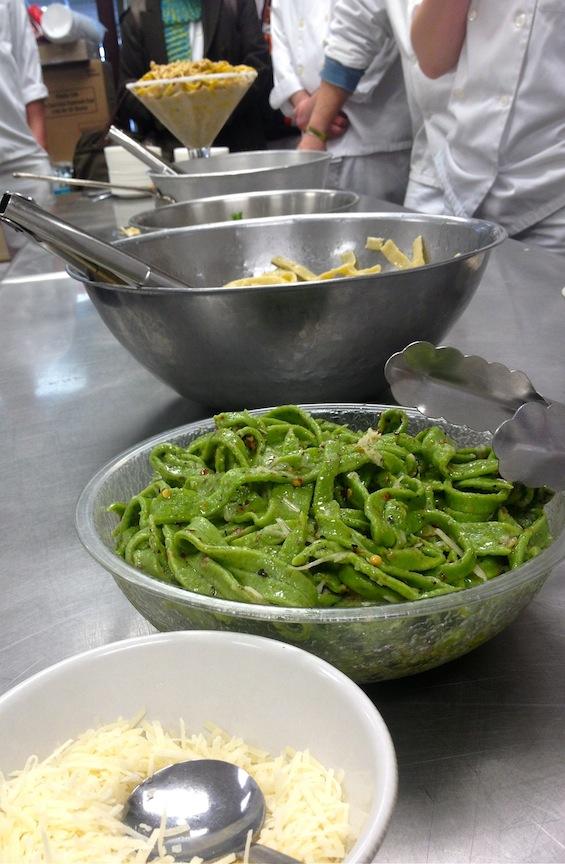It’s hard to believe that
four months ago, I traded I-9’s and benefits enrollment packets for recipes and
knives. Last fall, I left my full time
job to be a full-time culinary student at Minnesota State Technical and
Community College in the sleepy town of Moorhead, MN. The culinary program
takes approximately four semesters to complete and I just began my second
semester in January. I hope to graduate in Spring of 2014.
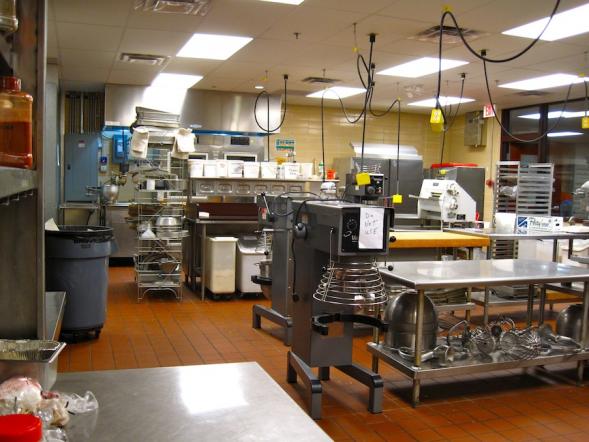 The Culinary School KitchenMy decision to enroll in
culinary school was both spontaneous and a long time coming. For as long as I
can remember, I have been fascinated by food. Experimenting in the kitchen wasn’t
encouraged in my household, so I read a lot of cookbooks, watched a lot of
cooking shows, and tucked all my curiosity away for another time. Another
time arrived during my senior year
of college when I moved into the Cadillac of our college’s on-campus housing. I
shared a small house with four other women and reveled in our very own kitchen.
Equipped with a modest food budget and a captive audience, I remember baking
chicken wings at midnight and welcoming home a housemate who returned from a
semester in Mali with African peanut stew. But somehow, I never thought of
pursuing food as a career or combining it with writing.
The Culinary School KitchenMy decision to enroll in
culinary school was both spontaneous and a long time coming. For as long as I
can remember, I have been fascinated by food. Experimenting in the kitchen wasn’t
encouraged in my household, so I read a lot of cookbooks, watched a lot of
cooking shows, and tucked all my curiosity away for another time. Another
time arrived during my senior year
of college when I moved into the Cadillac of our college’s on-campus housing. I
shared a small house with four other women and reveled in our very own kitchen.
Equipped with a modest food budget and a captive audience, I remember baking
chicken wings at midnight and welcoming home a housemate who returned from a
semester in Mali with African peanut stew. But somehow, I never thought of
pursuing food as a career or combining it with writing.
After working with nonprofits for several years after college, I thought I might like to become a chef. I investigated culinary schools in the Twin Cities, but their price tags were aggressive. One pressured me to sign up for loans after my campus tour and hounded me with phone calls after my visit. The admissions representative even went to far as to tell me that if I didn’t enroll for the upcoming semester, it meant I wasn’t dedicated to pursuing my dreams.
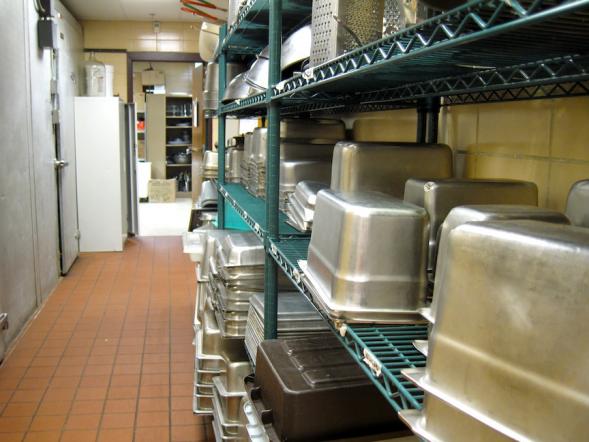 The Equipment Rack
The Equipment Rack
Finally, I called a prominent, local chef who encouraged me to look at a community college program and let me volunteer in her kitchen once a week. Having read Kitchen Confidential, I braced myself for screaming and humiliation. Instead, I was treated with a great deal of kindness. I learned a lot and tasted many new foods, though I wasn’t convinced I wanted to pursue a career as a chef. Years later, I feel like I’ve made a complete circle, finally enrolling in my community college’s culinary program, the only one in this area. My ultimate goal still isn’t necessarily to become a chef. To be honest, I’m not sure where this education will lead, but I hope it leads to some kind of food-related profession and assists me in writing better recipes.
Each semester consists of a morning lab and afternoon classes. We arrive at the kitchen between 7-8 a.m. to prepare food for the school’s breakfast and lunch services. Lab groups consist of 4-8 students who focus on a certain area of food prep such as baking, salads and sandwiches, or deep frying and grilling. Second-year students supervise the first-years. They also take turns planning the menus and create production sheets from which each lab works.
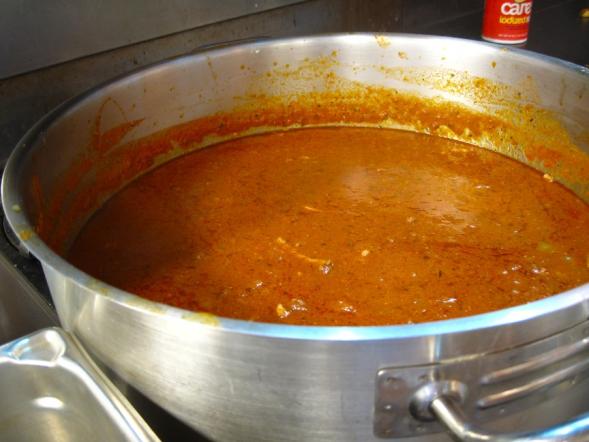 Lasagna SoupI spent half of my first
semester in salad lab, and the second half in baking. From September through
October, I made nearly every deli salad imaginable. In addition, I spent hours
breaking down carrots and celery into sticks and radishes into roses.
Definitely not my favorite lab, which made the transition to baking seem like
bliss. In the afternoons, we alternated between two classes. We learned
culinary basics like fluting mushrooms and making homemade pasta in our Intro
class. Then, we learned how to make stock and basic sauces in our Soups,
Stocks, and Sauces class.
Lasagna SoupI spent half of my first
semester in salad lab, and the second half in baking. From September through
October, I made nearly every deli salad imaginable. In addition, I spent hours
breaking down carrots and celery into sticks and radishes into roses.
Definitely not my favorite lab, which made the transition to baking seem like
bliss. In the afternoons, we alternated between two classes. We learned
culinary basics like fluting mushrooms and making homemade pasta in our Intro
class. Then, we learned how to make stock and basic sauces in our Soups,
Stocks, and Sauces class.
This semester, I’ll begin in Quantity lab and prepare soups, vegetables, and other side dishes. I’m guessing it’s called Quantity lab because we prepare large quantities of these foods for the lunch menu. (Still, last week, one of our lab’s assignment sheets was titled “Quality Lab,” so the reason may not be explicitly clear to even the second year students.) Then, I’ll finish the semester in Butcher lab slicing deli meats, breaking down chickens, and preparing roasts. Afternoon courses will focus on menu planning, and meats and seafood. I’m most excited about the hands-on aspect of this class. I’m especially excited for the lesson on preparing Peking ducks, where we’ll use bicycle pumps to separate the skin from the meat to ensure the dish’s signature crispy skin. As an elective, I signed up for a weekly introduction to wine course, the first part of an ongoing series of classes.
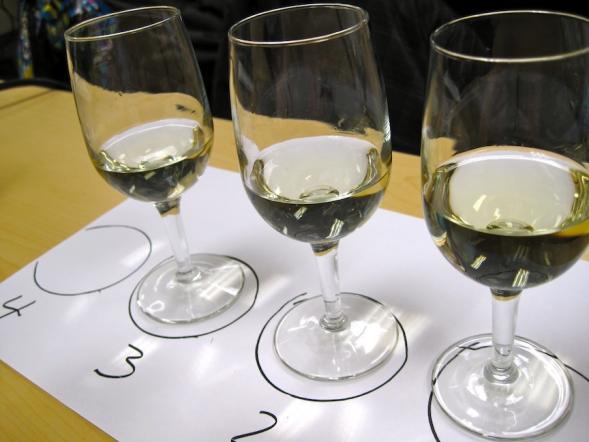 A Wine Tasting in Introduction to Wine
A Wine Tasting in Introduction to Wine
One of my favorite things about culinary school is that it forces me to cook things I wouldn’t choose to make on my own. I could live happily ever after without ever making French dressing and pear salad again, but was thrilled when my teacher provided one-on-one instruction on making pie crust. When I’m at home, I find it too easy to avoid preparing foods that make me uncomfortable. For example, I’ve ruined enough large pieces of meat that I’ve come to avoid cooking or attempting to butcher them. Many foods are simply too expensive to experiment with. And then there’s wine. I’ve always found the world of wine to be pretentious and intimidating, so I welcome this opportunity to learn with others as clueless as myself. Home cooking has taught me a lot, but culinary school provides access to ingredients in a supervised environment. Plus, it’s ok to make mistakes and even better, to learn how to fix them.
Compared to programs in the Twin Cities, our program seems to be executed on a smaller scale. The program always has a waitlist, but class sizes are kept small so that students don’t overcrowd the kitchen that was only recently expanded. Our two teachers instruct us in everything. I especially admire our lab instructor who demonstrates the patience of a saint, as students holler her name and tug at her chef’s jacket for assistance throughout morning. Our instructors work long days and manage to remain engaging – no one would ever doubt that they love their jobs. The smaller program means there aren’t specific emphases such as pastry or cheese. On the flip side, the class operates much like a close-knit family, which carries the same rewards and frustrations of real families everywhere. I look forward to sharing this experience with you as the semester continues.
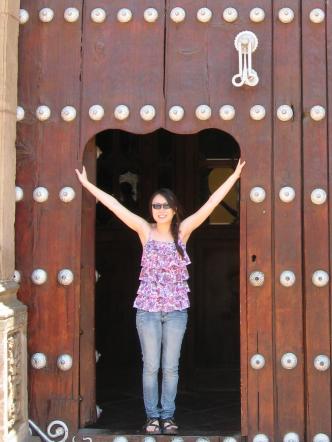
Jeni Hill grew up in the Twin Cities and recently moved to Fargo. Her two sustaining passions are food and writing and she combines the two whenever she gets the chance. Jeni believes food is never just about the food and considers it the finest medium to connect with others. When she is not crafting contributions to Simple Good & Tasty, she may be posting to her blog An Herbalist Eats, 20food, or Fargo's High Plains Reader. Her last series for SGT was Farm to Fork, a CSA Series.

